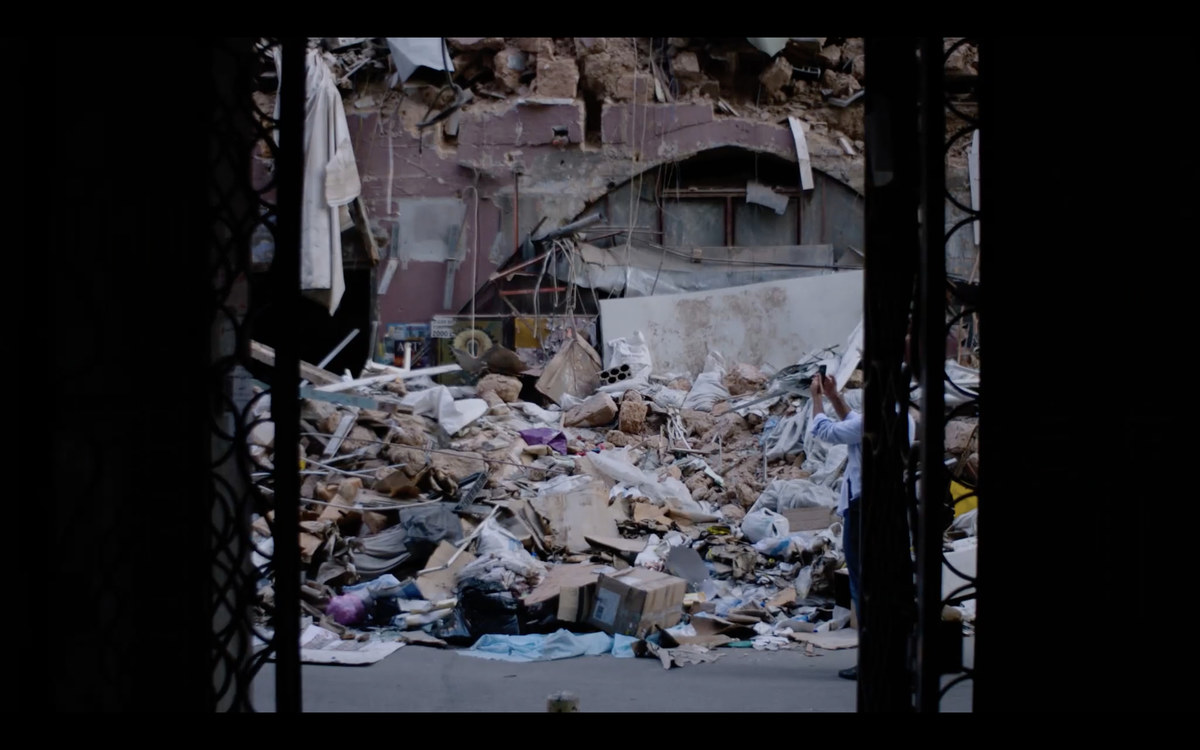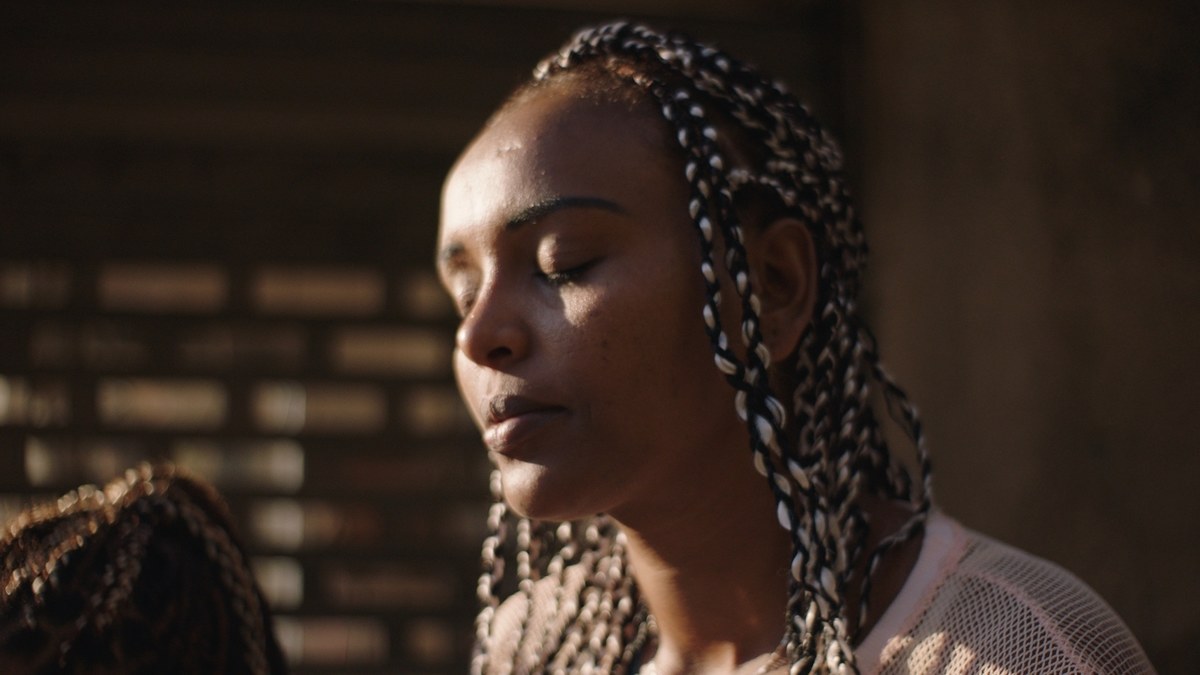DUBAI: When Karim Kassem arrived in Beirut on Aug. 3, 2020 to make a film called “Octopus,” he was quarantined in a hotel overlooking the city’s port. So he settled in, made what preparations he could, and got some rest. The following day his mother joined him and the two of them sat six feet apart on the hotel’s balcony. They chatted, probably drank some coffee or tea, and were enjoying the late afternoon when the filmmaker saw a mushroom cloud over the port. He immediately grabbed his mother and ran inside. Both were blown from the room.
“From that very moment I decided to make a different ‘Octopus,’” says Kassem. “I just had to go back home, make sure my dad and my sisters were OK, and then immediately begin to plan this silent film. And I knew from the onset that it was going to be silent. It was almost necessary to make it silent, because anything you said would become diluted. It would dissolve immediately into soup.”

Karim Kassem started working on “Octopus” in 2020. (Supplied)
What emerged from that initial reaction is impossible to pigeonhole. Although “Octopus” won the Envision Competition at the International Documentary Film Festival Amsterdam in 2021, the traditional characteristics of a documentary are largely absent from Kassem’s film. There is no dialogue, no explanation, no story. The only brief snippet of speech is from a radio broadcast. What there is instead is a series of slow, lingering shots of traumatized people, of empty streets, of collective endeavor. All filmed with a level of patience and poetry that is sometimes mesmerizing.
At its most elemental, “Octopus” is a collection of beautifully framed shots accompanied by a darkly ambient score. About two thirds of the way through the film, the camera concentrates on a single neighborhood junction in Beirut and remains fixated on it for a long period of time. As the sound of church bells mingles with the clamor of reconstruction, the camera pans left and right, but for the most part it simply observes.
“My editor calls that shot the ‘Pasolini shot,’ (a reference to Italian filmmaker Pier Paolo Pasolini)” says Kassem with a smile. “Because it just lingers forever. There was no other way to make the film for me. It was largely instinctive. My background is in philosophy, so I try to emulate what I think is a, let’s say, ontological or metaphysical position and implement that into the culture. And really the purpose of this film is to ask the questions, ‘What is our purpose?’ ‘What is the meaning of life?’ and ‘What is the nature of reality?’ It was made to feel timeless. It’s not a place, it’s not a time, it could be anything. There could be no log line, you could just walk in and watch. You can make whatever you want of it.

“Octopus” is a collection of beautifully framed shots accompanied by a darkly ambient score. (Supplied)
“But I did work a lot prior to shooting, finding people and taking their numbers. You talk to them, you tell them you’re going to film this, and then you go and film it as though it were a documentary. You make it look like that on purpose. But for me, it’s a hybrid. There are aspects of documentary, but I don’t even know what that means anymore.”
Filming began a month after the explosion and lasted for 36 days. With Kassem — who directed, produced and shot the film himself — were a production coordinator and an occasional assistant. Although some people would talk to him for hours, they weren’t always willing to be filmed. But because Kassem had experienced the explosion firsthand, people would let him in.
“I was traumatized all the way through. I don’t even remember how I made this film,” he admits. “It’s beyond me. I didn’t know what was going on because I was in shock. I purposefully waited a month because by then they had cleaned almost everything up. I could’ve shot immediately, when there was way more destruction, but I shot way later. By then, the emotions had started to actually sink in and those thousand-yard stares really became present. That was the time for me to make the film.”

“Octopus” won the Envision Competition at the International Documentary Film Festival Amsterdam in 2021. (Supplied)
For Kassem, who lived in New York for a decade before spending most of last year either in Beirut developing his fourth feature or hopping from place to place, the film’s dialogue is an inner one with the viewer. As such, the film can be interpreted in an infinite number of ways. At the beginning of the film, for example, an unnamed man drives a truck full of doors to a location on the outskirts of Beirut, where an octopus is stenciled onto each one. At the end of the film, those stenciled doors are carried through Beirut, although the carrier receives no response when he attempts to deliver them to apartments in the city.
What is the significance of this and the octopus itself? Kassem says there’s no right or wrong answer. One interpretation could be that the tentacles of the octopus represent the multiplicity of human experience and thought. Or it could be a simple ode to the sea (when the camera goes beneath the waves it finds only trash). Maybe it’s political. “You could say, ‘Yeah, this government feels like an octopus, operating underneath,’” he says. “We never really see it, but it’s controlling everything. Every step you take in Beirut, you’re just under control somehow — you feel like you have agency, but you really don’t.”
Supported by the Red Sea Fund and the Doha Film Institute, Octopus had its Middle East and North Africa premiere at Jeddah’s Red Sea International Film Festival in December. This was followed by the world premiere of his third film — called “Thiiird” — at the International Film Festival Rotterdam in February. Starring the door carrier from “Octopus,” “Thiiird” is the film that Kassem had originally set out to make when he arrived in Beirut in August 2020. Now, he says, it is “like an echo of the ideas that I had for the original ‘Octopus.’”

A still from “Octopus.” (Supplied)
Featuring a cast of non-actors, the film tells the story of a car mechanic struggling to make ends meet during the country’s economic crisis. But when people bring their cars to him to be fixed, it quickly becomes apparent that it is the owners who need fixing.
“He becomes a sort of therapist,” explains Kassem. “And his garage becomes this environment in which we all dive into our subconscious.”
“Thiiird” is the third film that Kassem has made in as many years. Now working on his fourth, he has been prolifically churning out films like there’s no tomorrow. Why?
“Because I know it takes a lot of time to make films and I don’t know if I’m going to die tomorrow,” he replies. “I’ve always had this belief — from very early in my life — that I would die very soon, which is normal, I think. It’s a philosophy that drives me. I might not make a film for two years, maybe three, four… I don’t know. Life takes you in different directions.
“But it’s been three years — three feature films back-to-back with no help whatsoever. I produced all of them myself independently. I’ve been lucky getting post-production grants from the Red Sea Fund, Doha and AFAC, but with no backing, with no name whatsoever. I’ve kind of come from the underground really. I’m just an indie filmmaker doing my own thing.”











